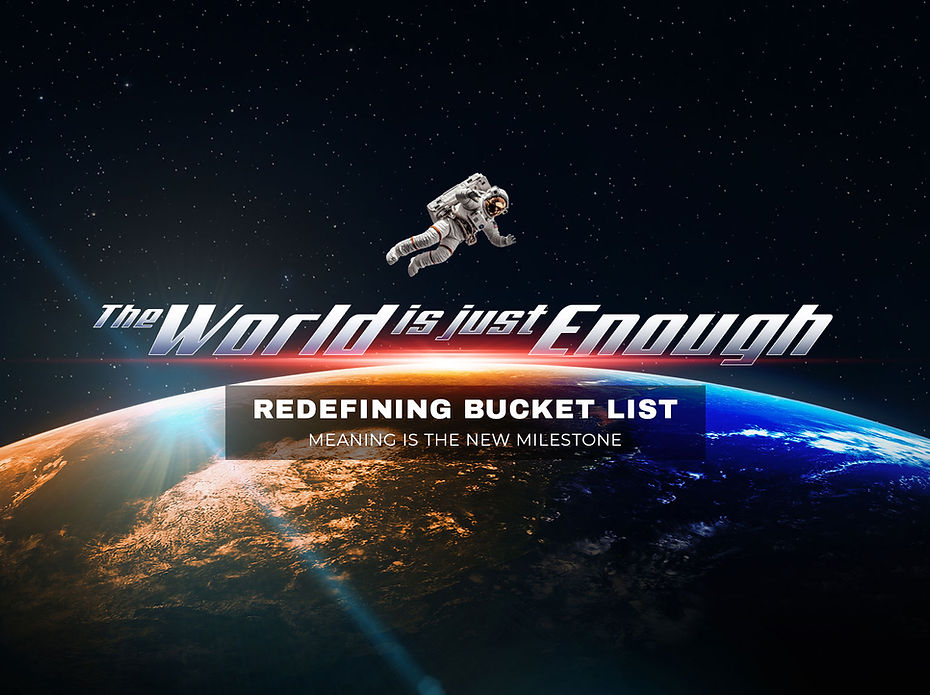
THE WORLD IS JUST ENOUGH
REDEFINING BUCKET LIST: MEANING IS THE NEW MILESTONE
Aranya Deb, August 1, 2025

For years, the “bucket list” was the ultimate travel motivator — a checklist of must-see places and must-do experiences before time ran out. But as the world recalibrates after the pandemic, travellers are asking a deeper question: Is ticking off destinations enough?
More and more, the answer is no. Today’s travellers are shifting from simply collecting places to cultivating experiences that transform, heal, and connect. It’s not about discarding the bucket list — it’s about rewriting it with purpose.
The post-pandemic reset
The pandemic forced us to pause and reassess the value of time, space, and presence. Suddenly, the race to see as much as possible in as little time as possible felt hollow. We began to crave slower, more meaningful encounters with the world. A quiet morning in a mountain village, a conversation with a local craftsman, or learning a grandmother’s secret recipe can hold far more meaning than a packed itinerary of tourist spots. This is the evolution of travel — from consumption to connection, from performance to presence.
The slow travel mindset
Slow travel is not about speed; it’s about intention. It encourages longer stays, fewer but richer experiences, and the courage to let go of the need to “see it all.” A slow traveller prefers neighbourhood cafés to crowded landmarks, meandering walks to rigid timetables, and authentic human stories to curated postcard views. Slow is not just a pace, but a philosophy—one that values immersion over accumulation.
Travel with purpose: Aligning with global goals
Tourism is powerful, but it’s also resource-intensive. The UN Sustainable Development Goals (SDGs) give us a framework for responsible travel. Supporting local communities (SDG 8), reducing waste and choosing eco-conscious stays (SDG 12), and prioritizing low-carbon transportation (SDG 13) are all practical ways to travel with integrity. Protecting heritage sites, marine life, and fragile ecosystems (SDG 11, 14, and 15) is no longer optional — it’s essential for the future of travel.
These goals aren’t abstract — they can guide how each of us chooses where to stay, what to spend on, and how to engage with a destination.
Asia’s new travel story
Asia is at the heart of this transformation.
In India, younger travellers are moving beyond whirlwind European tours and rediscovering the diversity of their own country — from the Northeast’s slow-living villages to Himalayan treks and mangrove conservation stays. Homestays, cultural immersion, and nature-based tourism are shaping a new narrative of travel that is deeply local.
In China, citywalks and rural retreats are replacing oversized group tours. Travellers are seeking wellness, culture, and calm, with a growing interest in tea estates, intangible heritage workshops, and quiet countryside escapes.
Across Asia, the trend is clear: travellers are seeking authenticity, privacy, and depth—and they value personal growth far more than Instagrammable moments.
The bucket list, redefined
“Once-in-a-lifetime” experiences are losing their meaning. It’s not that people don’t want to see iconic places — they do. But the motivation is shifting. It’s less about proving you were there and more about understanding why you went. Modern travellers want stories they don’t feel compelled to post online, but stories that change their perspective. The new bucket list is about emotional milestones, not geographical ones.
 |  |  |
|---|---|---|
 |  |  |
The rise of purposeful travel
A growing number of travellers are seeking transformative journeys—experiences that teach, heal, and give back. From coral reef restoration projects to indigenous craft residencies, these experiences enrich both the visitor and the host. Purposeful travel goes beyond entertainment; it’s about forming real connections and leaving a positive imprint.
Luxury reimagined
Luxury no longer means opulence or excess. It means time, privacy, and connection. A meal cooked with fresh, local ingredients can feel more luxurious than a formal dinner in a five-star hotel. Spending days in one village, learning its rhythm and stories, can create a sense of wealth that no lavish resort can match. This understated, meaningful form of travel is the new definition of elite—one based on discernment, not display.
Travelling with a new lens
The future of travel is not about abandoning dreams of seeing the world—it’s about travelling consciously and with clarity. Instead of asking, “Where have I been?” we might ask, “What have I learned? Who benefited from my journey?” Destinations are not stages for personal performances; they are living, breathing cultures that invite us to participate with respect and humility.
#MeaningIsTheNewMilestone
Travel is undergoing a quiet but profound revolution. Its true value is no longer measured by the number of stamps in a passport, but by the depth of connection it fosters—with people, with the planet, and with our own inner selves.
The next era of travel belongs to those who choose slowness, authenticity, and purpose—those who understand that a single meaningful experience can hold more weight than a dozen hurried stops. To travel well is to leave behind stories of care, respect, and renewal - not just footprints.
